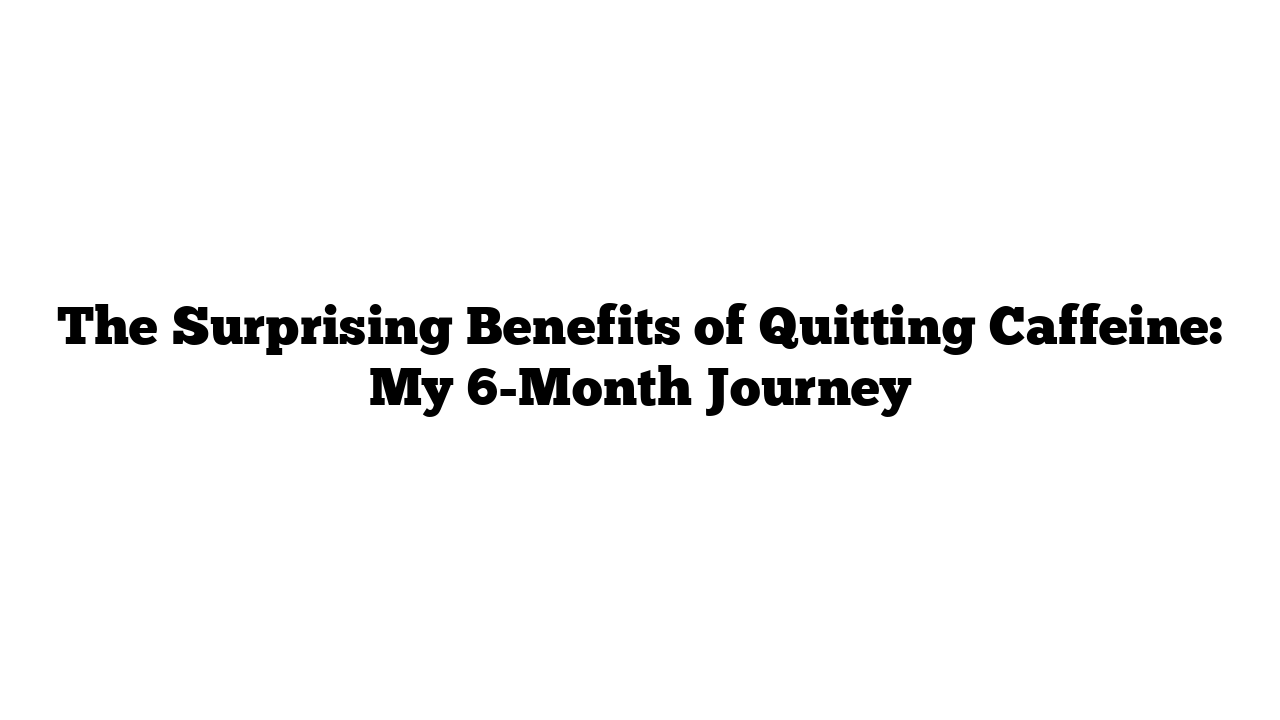Caffeine is a popular stimulant that many people rely on daily. For years, I was one of those individuals. From my eighth-grade algebra class, where I struggled to stay awake, to my daily coffee habit, caffeine played a significant role in my life. However, I recently decided to embark on a six-month caffeine-free journey. Here’s what I discovered about my body and mind along the way.
The Caffeine Dependency: A Personal Story
In eighth grade, I often found myself exhausted during my first-period algebra class. I would struggle to focus and stay alert. My late-night gaming sessions—often until 2 a.m.—didn’t help either. In an attempt to combat my fatigue, my mom suggested I try coffee. That simple recommendation led to a caffeine addiction that lasted until 2019. I drank at least one cup daily, and even when I switched to green tea earlier this year, caffeine remained a constant in my life.
After quitting alcohol and smoking weed, I decided to tackle my caffeine habit. The goal? To quit caffeine for six months—much longer than my previous attempts, which typically lasted only a week or two.
The First Month: Withdrawal Woes
I had no structured plan; I simply aimed to eliminate all caffeine sources, including coffee, green tea, and energy drinks. I went cold turkey from the start, ditching my daily cup of green tea.
The first month was brutal. I woke up feeling groggy, unmotivated, and inattentive. The comforting morning routine I’d enjoyed was gone—no warm cup in my hands, no invigorating aroma filling the air. I felt less productive, struggled to concentrate, and suffered from intense headaches.
As I contemplated quitting this challenge, I reminded myself: these were just withdrawal symptoms from a drug. Knowing that helped me push through.
Months Two and Three: A Transformation
Months two and three brought a remarkable transformation. Gradually, I noticed the withdrawal symptoms fade. I felt a surge of energy I hadn’t experienced before. Surprisingly, I became consistently happier. I no longer had that craving mindset where I felt I needed coffee to function.
My workouts improved, too. I could push through exercises without relying on caffeine for that extra boost. Most importantly, my sleep quality improved dramatically. Studies suggest caffeine can affect sleep quality, even in small amounts. Each morning, I woke up feeling more rested.
Months Four to Six: A New Normal
As I entered months four through six, I felt fantastic. The benefits persisted: no headaches, no grogginess—just natural energy. I realized I had developed a healthier relationship with my body, free from the need for external stimulants.
You might wonder, “Why quit caffeine if it’s widely consumed and considered beneficial?” The truth is, I prefer not to depend on a substance to enhance my body’s natural state. I advocate for a holistic approach: eat well, exercise regularly, and prioritize rest. If caffeine brings about withdrawal symptoms, it’s worth considering whether it’s good for you.
How to Quit Caffeine: A Gentle Approach
If you’re considering quitting caffeine, it’s crucial to approach the process gently. Most people consume more caffeine than I did. Here are some tips for success:
- Wean Off Gradually: If you typically drink two cups a day, reduce to one and a half cups for a week. Then drop to one cup, and finally down to half a cup. This method can help minimize withdrawal symptoms.
- Remove Temptations: Clear your home of all caffeinated beverages. This way, even if you feel tempted, you won’t have immediate access.
- Try Herbal Teas: Replace your morning cup with caffeine-free herbal tea. While it won’t replicate the exact experience, it can still offer warmth and comfort.
- Be Patient: Give yourself at least one or two months without caffeine to fully appreciate the benefits.
The Takeaway
Quitting caffeine was one of the most challenging yet rewarding experiences of my life. The health benefits—improved sleep, better energy levels, and enhanced mood—were worth the effort. If you’re contemplating a similar journey, I encourage you to give it a try.
If you’re interested in exploring more about the effects of caffeine and other health-related topics, visit medicaltimes.io for insightful articles.
